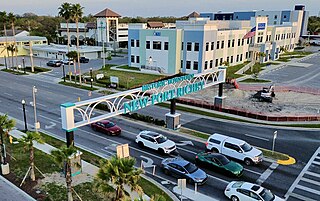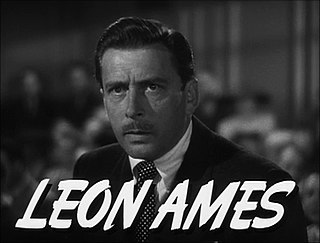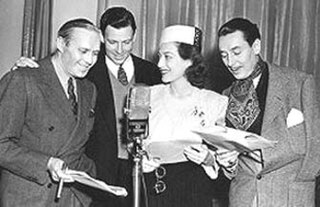
The Silvermoon Drive-In is a drive-in theatre in Lakeland, Florida. Established in 1948, it is the last remaining drive-in of Polk County, Florida. [1]

The Silvermoon Drive-In is a drive-in theatre in Lakeland, Florida. Established in 1948, it is the last remaining drive-in of Polk County, Florida. [1]
The Silvermoon was founded on April 14, 1948. Admission was only 35 cents per person. The opening attraction was Up Goes Maisie , starring Ann Sothern and George Murphy. The Theatre was owned and operated by I. Q. Mize and M. G. Waring.
On May 23, 1950 the screen was damaged in a tornado, but the theatre was reopened on July 1, 1950. In 1952 I. Q. Mize and M. G. Waring sold the theatre to Carl Floyd owner of Floyd Theaters, a successful chain of theatres across Florida.
Floyd Enterprises was acquired by Burnup & Sims in the late 1970s, but they retained Harold Spears, who Carl Floyd had appointed the president of Floyd Theatres. In 1985 another screen was added.
In the 1990s Burnup & Sims merged with Mastec. When in 1996 Mastec told Mr. Spears to close the remaining drive-in theatres, he formed Sun South Theatres and bought the Silvermoon Drive-in and two other drive-in theaters. One of those theaters, the 28th Street Drive-In in St. Pete was closed down in 2000. [2] The other theater, the Joy-Lan Drive-In in Dade City is still operating. [3] The cinema celebrated its 50th anniversary with a gala in 1998. [4] In 2022, both of the Silver Moon's screens were upgraded to laser projection systems.

New Port Richey is a city in Pasco County, Florida, United States. It is a suburban city included in the Tampa-St. Petersburg-Clearwater, Florida Metropolitan Statistical Area. The population was counted at 16,728 in the 2020 census.

A drive-in theater/theatre or drive-in cinema is a form of cinema structure consisting of a large outdoor movie screen, a projection booth, a concession stand, and a large parking area for automobiles. Within this enclosed area, customers can view movies from the privacy and comfort of their cars. Some drive-ins have small playgrounds for children and a few picnic tables or benches.
Southeastern Louisiana University (Southeastern) is a public university in Hammond, Louisiana. It was founded in 1925 by Linus A. Sims as Hammond Junior College. Sims succeeded in getting the campus moved to north Hammond in 1928, when it became known as Southeastern Louisiana College. It achieved university status in 1970.

AMC Entertainment Holdings, Inc. is an American movie theater chain founded in Kansas City, Missouri, and now headquartered in Leawood, Kansas. It is the largest movie theater chain in the world. Founded in 1920, AMC has the largest share of the U.S. theater market, ahead of Regal Cinemas and Cinemark Theatres. After acquiring Odeon Cinemas, UCI Cinemas, and Carmike Cinemas in 2016, it became the largest movie theater chain in the world. It has 2,807 screens in 353 European theaters and 7,755 screens in 593 American theaters.

Leon Ames was an American film and television actor. He is best remembered for playing father figures in such films as Meet Me in St. Louis (1944), Little Women (1949), On Moonlight Bay (1951) and By the Light of the Silvery Moon (1953). His best-known dramatic role may have been in the crime film The Postman Always Rings Twice (1946).

Muvico Theaters was a movie theater chain headquartered in Fort Lauderdale, Florida. Muvico had seven complexes in Florida, one in the Chicago metropolitan area (Rosemont), and one in Thousand Oaks, California. Muvico's theaters were known for the use of decorative themes at several theaters, such as the Egyptian, 1950s drive-in, French opera house, Mediterranean palace, and 1920s grand movie palace themes.

Carmike Cinemas, Inc. was an American motion picture exhibitor headquartered in Columbus, Georgia. As of March 2016, the company had 276 theaters with 2,954 screens in 41 states, and was the fourth largest movie theater chain in the United States. The company billed itself as "America's Hometown Theatre" and Carmike theaters were largely positioned in rural or suburban areas with populations under 200,000. The company's theaters operated under various names and generally had a name followed by the number of auditoriums at that location; for example, "Carmike 15".

An anthology series is a written series, radio, television, film, or video game series that presents a different story and a different set of characters in each different episode, season, segment, or short. These usually have a different cast in each episode, but several series in the past, such as Four Star Playhouse, employed a permanent troupe of character actors who would appear in a different drama each week. Some anthology series, such as Studio One, began on radio and then expanded to television.
The Fort Lauderdale Swap Shop is an 80 acre indoor and outdoor flea market, featuring a 14-screen drive-in theater in Fort Lauderdale, Florida. From 1989–2006 the Hanneford Family Circus performed daily in the Swap Shop food court, entertaining the roughly 12 million people who visit each year.

Dan White was an American actor, well known for appearing in Western films and TV shows.

Richard Comstock Hart was an American actor, who appeared in film and TV productions, but was most active on stage.

Malco Theatres, Inc. is a family owned and operated movie theater chain that has been in business for over one hundred years. It has been led by four generations of the Lightman family. Malco Theatres features 34 theatre locations with over 345 screens in six states. Malco also operates three bowling centers and a family entertainment center in southern Louisiana and a family entertainment center in Oxford, Mississippi.

The Screen Guild Theater is a radio anthology series broadcast from 1939 until 1952 during the Golden Age of Radio. Leading Hollywood stars performed adaptations of popular motion pictures. Originating on CBS Radio, it aired under several different titles including The Gulf Screen Guild Show, The Gulf Screen Guild Theater, The Lady Esther Screen Guild Theater and The Camel Screen Guild Players. Fees that would ordinarily have been paid to the stars and studios were instead donated to the Motion Picture Relief Fund, and were used for the construction and maintenance of the Motion Picture Country House.

Robert Lenard Lippert was an American film producer and cinema chain owner. He was president and chief operating officer of Lippert Theatres, Affiliated Theatres and Transcontinental Theatres, all based in San Francisco, and at his height, he owned a chain of 139 movie theaters.

Den Nationale Scene is the largest theatre in Bergen, Norway. Den Nationale Scene is also one of the oldest permanent theatres in Norway.

Beverly Drive-In Theatre opened May 29, 1948, as a cinema structure in Forrest County, Mississippi. It was operated continuously by the original owners until 1987, then reopened in 2001 under new management. Following substantial damage to the infrastructure by Hurricane Katrina in 2005, the Beverly Drive-In never recovered. In 2008, the drive-in was listed on the National Register of Historic Places. In 2010, a fire of unknown origin destroyed the facility.
Silver Moon may refer to:

Jungle Goddess is a 1948 American action/adventure crime film starring George Reeves, Ralph Byrd, and Wanda McKay. Directed by Lewis D. Collins, the film was based on an idea by producer William Stephens.
Richard Stoddard Aldrich was an American theatre producer, theatre manager, director, and diplomat. He was an officer with the United States Navy reserves during World War II and the Korean War, and a diplomat with the United States Foreign Operations Administration and International Cooperation Administration. He produced more than thirty plays on Broadway from 1933 through 1956, and also operated three summer theaters in Massachusetts. He was married to the actress Gertrude Lawrence until her death; their marriage was memorialized in his book Gertrude Lawrence as Mrs. A: An Intimate Biography of a Great Star (1955) and the Oscar nominated biographical musical film Star! (1968).